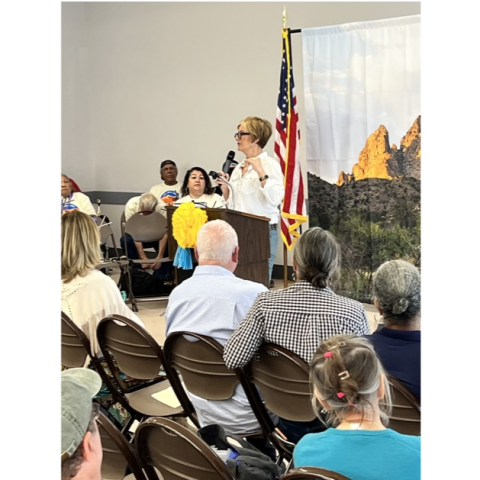Congresswoman Lee Celebrates One-Year Anniversary of Avi Kwa Ame’s National Monument Designation
Lee Was First NV Member of Congress to Call on Biden to Designate the Land as National Monument

SEARCHLIGHT – This past weekend, Congresswoman Susie Lee (NV-03) joined tribal leaders, the Friends of Avi Kwa Ame, local officials, and southern Nevada families at the Searchlight Community Center to celebrate the one-year anniversary of Avi Kwa Ame’s designation as a national monument.
On January 12, 2022, Lee was the first member of the Nevada congressional delegation to write a letter to the Biden Administration calling for Avi Kwa Ame to be designated as a national monument. After Lee invited Interior Secretary Deb Haaland for a site visit, the two joined members of the Fort Mojave Tribal Council for a tour of the proposed monument site in September 2022. Following Lee's letter and Secretary Haaland’s site visit, President Biden publicly promised to preserve Avi Kwa Ame at the White House Tribal Nations Summit in November 2022. On March 21, 2023, President Biden formally established the Avi Kwa Ame National Monument.
Spanning over 500,000 acres, Avi Kwa Ame is a sacred site for 12 Native American tribes in Nevada and across the West and contains some of the most visually stunning and biologically diverse lands in the Mojave Desert. Avi Kwa Ame and its precious ecosystems are now protected under the 1906 Antiquities Act.
“I’m proud to have been the first Member of Nevada’s congressional delegation to call on the Biden Administration to designate Avi Kwa Ame as a national monument,” said Congresswoman Susie Lee. “I remember in 2022 being here and walking step-by-step with our Tribal leaders and Secretary Haaland to discuss the need for federal protections on this sacred land. Now, as a protected national monument, the beauty, culture, and history of this land will be preserved for generations to come.”
Avi Kwa Ame is considered to be among the most sacred places on Earth by the Mojave, Chemehuevi, and some Southern Paiute people. It is also important to other Tribal Nations and Indigenous Peoples including the Cocopah, Halchidhoma, Havasupai, Hopi, Hualapai, Kumeyaay, Maricopa, Pai Pai, Quechan, Yavapai, and Zuni Tribes. The area is also home to the one of the world’s largest Joshua tree forests, and provides continuous habitat or migration corridors for species such as the desert bighorn sheep, desert tortoise, and Gila monster.

###